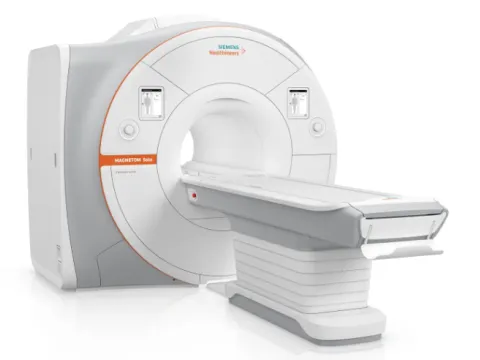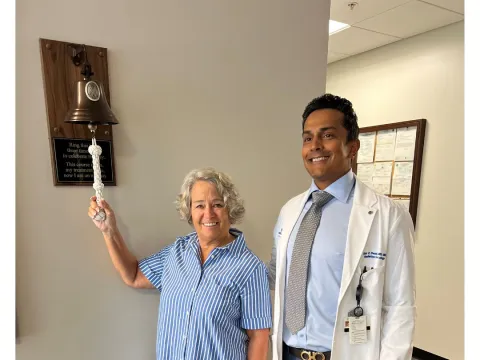- AdventHealth

AdventHealth is taking another step toward reducing its carbon emissions and achieving its environmental sustainability goals with an on-site solar energy installation at its corporate headquarters in Altamonte Springs, Florida.
The faith-based health system’s corporate headquarters employs nearly 5,000 team members who work to support the system’s operations and care delivery across the country.
Starting this week, the Maitland-based national solar developer ESA will begin the work to install more than 7,500 solar panels on top of four buildings and two garages that comprise the corporate campus. Additionally, solar canopies will be constructed throughout the parking lot surface and additional electric vehicle charging stations will be mounted that can support 62 electric vehicles.
“AdventHealth is pursuing sustainability initiatives that help ensure the long-term well-being of our team members, patients, communities, business and environment. This solar installation will help reduce our impact on the environment while demonstrating our commitment in a significant and tangible way,” said Christine Stewart, vice president of organizational integration and campus administration for AdventHealth.
The solar system will be approximately 3 megawatts in size and provide 4,200 megawatt hours of electricity annually, decreasing the reliance on utility-provided electricity on the campus by about a third and saving an estimated $20 million over 20 years. A system this size generates enough electricity to power over 550 homes for one year1. Scheduled for completion by the end of 2024, the solar installation will be one of the largest privately owned corporate solar projects in Florida.
"This collaboration represents the first step in a larger strategy to help AdventHealth meet their environmental goals with on-site clean energy," said Morgan Brawner, chief revenue officer at ESA. “By developing a comprehensive clean energy roadmap, ESA is supporting the health care sector as it aims to reach the ambitious goals outlined in the Health Sector Climate Pledge.”
As a signatory of the U.S. Health and Human Services Health Sector Climate Pledge, AdventHealth has pledged a 50% reduction by 2030 in its greenhouse gas emissions from electricity. In addition to on-site solar installations, the health system is also establishing long-term virtual power purchase agreements to fund the development and operation of large-scale renewable energy projects – such as wind and solar – in exchange for Renewable Energy Certificates and participating in community energy projects with local utility providers in some of the communities it serves.

Recent News

Pulmonologist joins AdventHealth Waterman
From nutrition and ICU to advanced bronchoscopy, Dr. Alba Rivera-Díaz brings bilingual, whole-person lung care to Lake County.

AdventHealth Avista opens food pantry to support community health
AdventHealth Avista has taken a significant step toward addressing food insecurity, a key priority identified in its Community Health Needs Assessment by opening a food pantry on its first floor. This...

AdventHealth Porter Earns COPPER Designation, Strengthening Pediatric Emergency Care
AdventHealth Porter is proud to announce that its Emergency Department has earned the Pediatric Advanced COPPER designation, a significant milestone that reflects a deep commitment to providing safe...

Three AdventHealth hospitals in Florida’s Volusia and Flagler counties earn top Leapfrog honors
Residents of Volusia and Flagler counties now have national confirmation of something many rely on every day: safe, high-quality hospital care close to home.

AdventHealth DeLand investing in next-generation MRI technology to enhance patient care
AdventHealth DeLand will soon install a new MRI system designed to deliver faster exams, sharper images and a more comfortable experience for patients in West Volusia.

Innovative new procedure offers hope for heart transplant candidates at high risk for rejection
Innovation at AdventHealth is driven by one purpose: helping people heal in body, mind and spirit.

The hidden cancer one clinician caught – and the process improvements she says matter most
Shana Vongkhankeo, APRN, discovered an unusual thyroid enlargement during a routine physical for a teenage patient, leading to a life-saving cancer diagnosis that highlighted how being fully present...

AdventHealth debuts first-of-its-kind Performer Health Program in Central Florida
AdventHealth is launching the Performer Health Program, a first-of-its-kind initiative in Central Florida focused on addressing the unique health needs of artists and performers.

AdventHealth Waterman strengthens access to expert specialty care with expansion of Mount Dora medical plaza
Second floor buildout adds orthopedics, sports medicine, women’s health and heart care for Lake County.

Expanding hope through innovation: AdventHealth advances cancer care across East Florida
Cancer touches nearly every family, and in Flagler, Lake and Volusia counties, the demand for timely, advanced care keeps rising. AdventHealth’s East Florida Division, which includes seven hospitals...

For two Hope Clinic patients, music spurs recovery
STROKESTRA heals stroke survivors in so many meaningful ways.

A new chapter begins: AdventHealth Avista opens its on-campus surgery center
This milestone marks a meaningful new chapter for a team whose history stretches back more than two decades.
